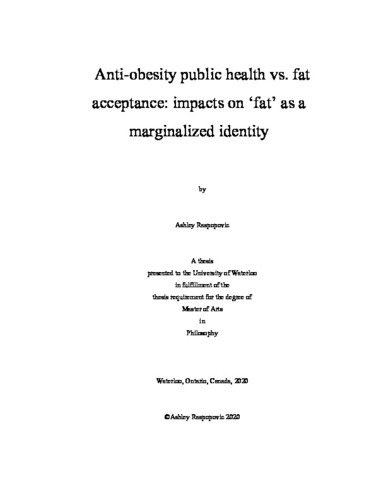| dc.description.abstract | I will argue that anti-obesity public health (AOPH), with a focus on Canadian AOPH, performs three functions with respect to the fat acceptance movements (FAMs). These are as follows. Firstly, AOPH distracts by derailing FAMs’ advocation for fat justice towards matters of health and the weight-science surrounding fatness. Secondly, AOPH covers up and creates new fat stigmatizing attitudes through the use of linguistic strategies such as medicalized language and devices called figleaves, which resonate with the public precisely because they enact deeply entrenched cultural themes of healthism. Lastly, AOPH attempts to eradicate fatness and thus fat-positive identities, which effectively aims to eliminate a valuable marginalized perspective, and epistemically disadvantages society as a result. Chapter 1 examines the content of the Canadian AOPH’s latest (2011) Obesity in Canada report, which contains a skew in favour of a dominant and problematic discourse on ‘fat’ as interchangeable with ‘unhealthy’ and therefore objectionable, representing a pervasive mode of shaping FAMs’ discourse that facilitates the derailment towards talk of health, weight science, and economic burden. Chapter 2 focuses on linguistic devices called anti-fat figleaves, which are statements or symbols that work to obscure fat stigmatizing speech acts, behaviours, or actions. These linguistic devices, in conjunction with a healthist cultural backdrop that elevates health to a supervalue and stigmatizes illness, work to reinforce anti-fat attitudes and fat discrimination, as disseminated by AOPH. Chapter 3 examines how the first two functions of AOPH, to distract fat justice and cover up fat stigma, shape and work to eradicate fat identity, using a model of marginalized identity formation to demonstrate this disruption and eradication of fat identity. I conclude that while there is a promising increase in focus on the harms of fat stigma and acknowledgement of fat autonomy in medicine, much more work needs to be done to do away with a weight-centred healthcare paradigm that reinforces fat discrimination through over-emphasis on obesity prevention and eradication. | en |

